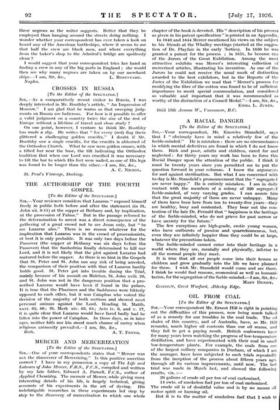MERCER AND MERCERIZATION
[To the Editor of the SPECTATOR.] Sin,—One of your correspondents states that " Mercer was not the discoverer of Mercerizing." Is this positive assertion correct ? I have in my possession a copy of The We and Labours of John Mercer, F.R.S., F.C.S., compiled and written by my late father, Edward A. Parnell, F.C.S., author of Applied Chemistry. The memoir of Mercer, while giving most interesting details of his life, is largely technical, giving accounts of his experiments in the art of dyeing. His indefatigable researches in these experiments led step by step to the discovery of mercerization to which one whole
chapter of the book is devoted. His " description of his process as given in his patent specification" is printed in an Appendix.
In 1843 and 1844 Mercer mentioned his views on the subject to his friends at the Whalley meetings (started at the sugges- tion of Dr. Playfair in the early 'forties). In 1850 he was granted a patent for the process ; in 1851, he became one of the Jurors of the Great Exhibition. Among the most attractive exhibits was Mercer's interesting collection of mercerized articles, illustrating his invention. As one of the Jurors he could not receive the usual mark of distinction awarded to the best exhibitors, but in the Reports of the Juries of the Exhibition we read that " Mercer's process for modifying the fibre of the cotton was found to be of sufficient importance to merit special commendation, and considered so valuable and important that it was recommended as worthy of the distinction of a Council Medal."—I am, Sir, &c., 1055 13th Avenue W., Vancouver, B.C. E3131A L. JUKES.










































 Previous page
Previous page